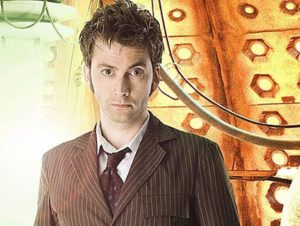Rose Ex Machina
Okay, so it was more like four weeks rather than two. My apologies. I didn’t look ahead enough to realize that I was scheduled to post while I was in San Antonio for the Lutheran Church—Missouri Synod’s National Youth Gathering. 25,000 people all in one city. It was really cool and really tiring. In some ways, I’m still trying to play catch-up. But I owe all y’all a column, don’t I, so let’s review:
1) I started by complaining about Enterprise, how a potentially good series blew it by using a tired time travel trope (say that five times fast!) in Crewman Daniels to fix problems, and how that ultimately was a deus ex machina.
2) I talked about the origin of the term deus ex machina, tracing it back to ancient Greek theatre. To the Greeks, every play ended with a “god out of the machine,” an actor who came out of the rigging to set all things right at the end of the play.
So now, where am I going with this?
Truth be told, I’m still not entirely sure. But I did see it pop up again. And I suspect by criticizing it, I’ll likely get yelled at.
Just recently, I started watching Dr. Who. I’ve been vaguely aware of the conventions. I knew Daleks were bad and said “Exterminate!” a lot. I knew that the Doctor regenerated, allowing the BBC to switch out actors. That was about it. Oh, and he has a thing for traveling with young ladies. But since the show is on Netflix and I finished my Star Trek marathon, I figured it was time to get caught up. And, wouldn’t you know it, I spotted a sort of deus ex machina at the end of one episode.
Or, to put it more specifically, a Rose ex TARDIS.
For those, like me, who are not die-hard Whovians, I offer the following warning:
The episode in question is The Parting of the Ways. The resurrected Dalek empire is about to invade the Station-thingy (see, I’m not totally indoctrinated yet), and the Doctor is going to do something with delta waves to destroy pretty much everything. Before he pulls the trigger, though, he sends Rose off in the TARDIS so she will survive.
The Doctor’s back is up against the wall. The Daleks chew through the station’s defenses, kill Captain Jack Harkness, and then are going to finish off their mortal enemy, the Doctor himself. There should be no way for the Doctor to escape.
Except he does anyway, because Rose does something…well, rather odd.
 After seeing a lot of graffiti that said “BAD WOLF” (a phrase that popped up a lot in Series 1), Rose somehow gets it into her head that she needs to look into the heart of the TARDIS (an action that she’s only seen once, which resulted in someone getting turned into an egg) to go back and get the Doctor. Even though she has no evidence that this will work, it does anyway, and she pops in filled with…glowy stuff (I’m still unclear on what, exactly, that was). She uses said glowy stuff to erase the Daleks from existence.
After seeing a lot of graffiti that said “BAD WOLF” (a phrase that popped up a lot in Series 1), Rose somehow gets it into her head that she needs to look into the heart of the TARDIS (an action that she’s only seen once, which resulted in someone getting turned into an egg) to go back and get the Doctor. Even though she has no evidence that this will work, it does anyway, and she pops in filled with…glowy stuff (I’m still unclear on what, exactly, that was). She uses said glowy stuff to erase the Daleks from existence.
Problem solved. The Daleks are gone, Captain Jack is resurrected, and all is right with the universe.
Yes, okay, I know, not everything was all right with the universe, but I still maintain that this was a deus ex machina. Why would Rose make the connection that Bad Wolf is her? How did she think that she had to look into the heart of the TARDIS? The logical leaps were too great for me. Rose’s solution didn’t arise from the action of the story.
Now, as I wrote this, I realized that we could almost accuse the whole show of being gigantic deus ex machinas. Machinii? Whatever. Think about it: the Doctor and his companion encounter something unusual. The Doctor ponders it for a while, and then bang, he not only figures out exactly what they’re dealing with but exactly how to deal with the problem, whatever it may be. It’s almost like a little god drops out of a machine and whispers the answer in the Doctor’s ear. Every. Single. Episode.
And yet, at the same time, I would also argue that the Doctor is not a deus ex machina, simply because it’s been established that he knows so much from his many travels. He’s how old? Nine hundred some years? He’s been to every time period imaginable, saw things that would liquefy our brains, and become such a powerful figure that just the mention of his name makes the mighty Daleks back up in fear. Now, if the show was about a newbie Time Lord out for a jaunt in his brand-spanking new TARDIS, none of this would work. It only makes sense that he has such an encyclopedic knowledge of life, the universe, and everything.
Wait. Wrong fandom, sorry.
My point is this: Rose saving the Doctor in A Parting of the Ways is a deus ex machina because Rose’s actions didn’t logically arise from within the story. But it’s not a deus ex machina when the Doctor comes up with crazy schemes precisely because it does arise from within his character. It’s part of the rules. He just naturally understands all of this…how does the phrase go? “Wibbly-wobbly timey-wimey” stuff?
In other words, a deus ex machina is only a deus ex machina if the solution is a complete break with the established rules of the story.
Hey, this actually brings me to my point…which I’ll talk about in two weeks.
I promise.































It’s still hard not to make jokes about Doctor-deus ex TARDIS-machina, but honestly, if there weren’t a separate trope for objects that can solve everything convenient to the plot (except when it’s convenient to the plot), the sonic screwdriver would be a deus ex machina. But the show’s pretty good at keeping him only NEAR infallible, especially in the later seasons. You know they do it to manipulate your feels, but you like these characters enough that it works. (**** you, Moffat!)
Honestly, i find the “Doctor ex machina” device more irritating than a “companion ex machina”. I can’t put my finger on what, exactly, it is that bugs me about it. Maybe it’s that while on the one hand the Doctor is supposed to be this brilliant, ancient, member of a race that is beyond the comprehension of us mere humans, and yet on the other hand he screws up a lot, and we’re constantly asked to empathize with him, identify with his actions, etc. I can’t evaluate in my head a character that isn’t supposed to fit in my head. Or maybe the writers just don’t successfully portray him as being this brilliant, ancient, beyond-my-comprehension being.
And i don’t like Moffat as a showrunner. But that’s a separate topic, i guess.
Yes, let’s keep producer debates out of this. Stephen had mentioned this in his post “Deus ex machinas and the Doctor”, and it’ll be interesting to see how your opinion differs from his.
To be fair, it wasn’t her plan to harness the power of the TARDIS. The idea was supposed to be that since the TARDIS is living, if Rose can “contact” it by opening up the panel, she could convince it to take her to help the Doctor. Of course, then the TARDIS decided to take over her body, but….
My point is that it isn’t quite as bad as it seems to be.
Timothy has a point. Not that Rose is my favorite companion, but after seeing The Doctor’s Wife, I have no problem believing that the TARDIS, not Rose, initiated most of the action there.
Enjoying your deus ex machina musings. Check out my story by that name originally published in Fear and Trembling, October 2007 issue. It was rejected once by a publisher who thought it was too, well, deus ex machina.
http://www.gkwerner.blogspot.com/search/label/supernatural
http://www.gkwerner.blogspot.com/